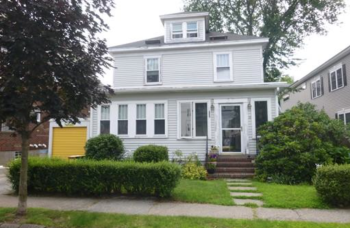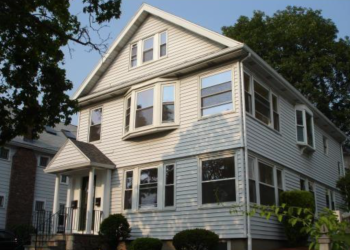Photo:
Belmont has a standing appointment each week with a town service it can not do without.
And it’s not the Board of Selectmen.
Town trash collection impacts every visitor, resident, business, and school in Belmont, and is as essential as water and electricity. The prospect of dealing with one’s garbage as some communities require – bagging, storing and hauling to a waste station – is a non-starter for many modern suburbanites.
So the early morning cacophony of squealing brakes and large compactors crushing tons of garbage arrives as sweet music to the ears of Belmontians.
According to town officials, residents and businesses are happy with the service – as long as the containers don’t fly off on blustery Spring days.
But this familiar service is likely to change, possibly significantly, as Belmont’s current trash and recycling collection contract with Somerville-based F W Russell and Son expires in June 2016.
In a presentation to the board by Department of Public Works Director John Marcotte and the town’s recycling coordinator, Mary Beth Calnan, the board – which will approve the subsequent contract – will need to be cognizant of changes in the trash collection industry while encouraging the public to embrace the new features.
“We want to do this in a way that people feel educated and that it’s not rushed,” said Belmont Town Administrator David Kale who with Marcotte is leading the town’s effort on crafting a new contract.
“If you tell people ‘You’re going to pay money for … an extra container or there [are] no more bulky items, I think that’s a change that you have to let people know about, so it’s not as painful [if it happens,]” said Kale.
The Selectmen appear willing to take an extended and deliberate approach before signing a new contract.
“Any changes will be a big deal for folks,” said Selectman Mark Paolillo.
“The radical changes that could take place years from now in terms of automated waste collection where the industry is going, I get it,” said Paolillo.
“Getting input today we could somehow inform our next contractor we may want to change it a little bit,” said Paolillo.
One approach the Selectmen is gravitating towards is extending the current contract with Russell – one of the largest residential trash collector in Massachusetts – by a year or 18 months to allow “our public process” to be completed, said Selectmen Chair Sami Baghdady.
The current $1.07 million contract calls for weekly collection of an unlimited number of barrels or bulk items – you take it to the curb, they’ll take it away – Monday through Thursday from just about 10,000 locations around Belmont. While Russell will take just about everything, appliances ($20) and anything with a CRT monitor ($15) cost extra, said Marcotte.
According to the state’s Department of Environmental Protection, Belmont is not such a trashy locale; at three-quarters of a ton of trash produced per household annually, the “Town of Homes” is well below the state’s goal of one ton of garbage annually from each pickup point.
Belmont compares nicely to neighboring towns such as Lexington with a five bag/barrel limit producing .74 tons of trash per household, Bedford with a single, 48-gallon barrel limit generating just under .9 tons. Only Arlington, with its three, 32-gallon barrel restriction, produces less at .63 tons.
On the recycling end, Belmont uses a biweekly dual stream recycling system separating paper and containers, at a yearly cost of $376,285. The material is sold in the commodity market with Belmont’s “cut” already calculated in the contract, said Marcotte.
Belmont’s yard waste is collected biweekly curbside 36 weeks. When the leaves begin falling, it is collected weekly.
While Belmont’s current garbage and recycling collection agreement has worked well, significant changes occurring in the removal industry will bring changes in collecting trash, according to Marcotte.
The first is automated collection in which a truck with a side arm picks up barrels and dumps the contents into a hopper. Firms like this mechanism as it reduces the number of employees and their associated costs.
But there is a large investment upfront for the town in purchasing the “carts” each household and business will be required to use.
Also, using carts will end resident’s unlimited trash collection and the free removal of “bulky” items that would require a traditional garbage truck.
The second is single-stream recycling in which a single container holds all materials. The upside is that it makes recycling much easier and in turn Belmont’s low recycling rate will increase.
The downside, according to communities using this system, is that many residents will put regular trash into the recycling bins, reducing net recycling percentages. And costs will jump as processors charge a “tip” fee based on what it takes in.
According to Marcotte, Belmont’s current dual stream system is “cleaner” (especially with paper products) which is more valuable to processors as it can be sold as commodities to large-scale recyclers in locations as far away as China.
Marcotte said the town will need to begin the process in the next month “because [the expiration date of the old contract] will be before us before you know it.”
Yet Baghdady said “the community needs to participate in the process of making a big change in the way trash is disposed [of].”





































































